- Home
- Diana Wynne Jones
The Pinhoe Egg Page 11
The Pinhoe Egg Read online
Page 11
But the mauve color kept making him think it was too cold. He carefully put a spell of warmth around it. Then, because it looked as if it would break rather easily, and he knew how careless Mary could be, he surrounded the warmth with a strong protection. To keep it properly safe beyond that, he made a sort of nest for it out of his winter scarf and hat and put the lot on his chest of drawers so that he could look at it from wherever he was in the room. After that, he had to tear himself away from it and go down to the playroom for lunch.
Cat had meant to tell them all—or Roger at least—that he had just been given this amazing new object, but the three of them looked so worried that he said, “What’s the matter?”
“Daddy’s disappeared,” Julia said.
“But he’s always disappearing!” Cat said. “Whenever someone calls him.”
“This is different,” Roger said. “He has a whole string of spells set up so that the people here know who’s called him and roughly where he’s gone—”
“And,” said Janet, who was still glum and red-eyed over Jason, “there are more spells to say if he’s run into danger, and none of them have been set off.”
“Mummy thinks he might not have had any clothes on when he went,” Julia chipped in. “Today’s dressing gown was thrown over a chair and none of the rest of his clothes seem to have gone.”
“That’s silly,” Cat said. “He can always conjure clothes from somewhere.”
“Oh, so he can,” said Julia. “What a relief!”
“I think it’s all silly,” Cat told her. “He must have forgotten to set off the spells.” He got on with his lunch. It was liver and bacon, and the smell reminded him of Marianne’s spell. He thought about that cat, Nutcase. Cats were queer animals. This one had struck him as unusually magical.
“Oh, I wish you weren’t so calm about things!” Janet said passionately. “You’re even worse than Chrestomanci is! Can’t you see when things are serious?”
“Yes,” Cat said, “and this isn’t.”
But by suppertime, when Chrestomanci had still not reappeared, even Cat was beginning to wonder. It was odd. When Cat thought about Chrestomanci, he had a calm, secure feeling, as if Chrestomanci was quite all right, wherever he was, but possibly wishing he could be there to supper; but when he looked at Millie, he saw desperate worry in her face, and in all the faces round the table, even Jason’s. Cat almost began thinking he ought to worry too. But he knew that would make no difference.
Still, when he went to bed that night and lay staring proudly at the big speckled mauve sphere sitting in his scarf across the room, Cat found himself hanging a piece of his mind out to one side, so that he would know in his sleep if Chrestomanci came back in the night. But all that piece of his mind caught was Syracuse, out in the paddock under the moon, wistfully eating grass and wondering why Cat had deserted him.
In the middle of the night, he had a strange dream.
It started with something tapping at his biggest window. Cat turned over in his sleep and tried to take no notice, but the tapping grew more and more insistent, until he dreamed that he woke up and shambled across the room to open the window. He could see a face through the glass, upside down, looking at him with shining purple-blue eyes. But he never saw it clearly, because a great white moon was directly behind it, dazzling him.
“Enchanter,” it said, muffled by the glass. “Enchanter, can you hear me?”
Cat put his hand on the catch and slowly pushed the window open. The face retreated upward to give the window room to open. Cat heard its feet shuffle on the roof and what were probably its wings flap and spread for balance. By the time he had the window wide open, he knew that a great shadowy dragonlike thing was sitting on the round turret roof above him.
“What do you want?” he said.
The face came down again and put itself through the window upside down. It was huge. Cat backed away from it, feeling a faint, dreamlike brush of what seemed to be feathers against his ear.
“You have my child in there,” the creature said.
Cat looked over his shoulder to where the moonlight gleamed softly off the strange object nestling in his scarf. He had no doubt that this was what the creature was talking about. “Then it’s an egg?” he said.
“My egg,” the great pointed mouth said.
With a dreadful feeling of loss and desolation, Cat said, “You want it back?”
“I can’t take it,” the creature answered sadly. “I’m under a sundering spell. I can only get free at full moon nowadays. We put the egg outside the spell, and I wanted to be sure that my child was in safe hands. It should be buried in warm sand.”
There was no difficulty about that. Cat turned toward the gleaming egg and converted his warmth spell into a warm sandy one. “Is that right? What else should I do?”
“Let it live free when it hatches,” the creature replied. “Give it food and love and let it grow.”
“I’ll do that,” Cat promised. Even in his dream he wondered how he would do it.
“Thank you,” the great beast said. “I will repay you in any way I can.” It withdrew its head from the window. There was a slight shuffling overhead. Then a great shadow dropped past the window on enormous outspread wings and wheeled away across the moon as noiselessly as an owl.
Cat staggered sleepily toward the egg, wondering how else he could fulfill the creature’s trust. In his dream, he doubled the amount of warm sand, made trebly sure that no one could knock it down or disturb it and, as an afterthought, covered it all over with love and friendship and affection. That should do it, he thought, wriggling down into his bed again.
He was quite surprised in the morning to find the window wide open. As for the egg, he could warm his hands on it from a yard away. It must have been one of those real dreams, Cat thought as he went off for his shower. Chrestomanci had said that they happened to enchanters.
When Cat came back, the redheaded maid, Mary, was in his room, glaring at the egg. “You expect me to dust that thing?” she said angrily.
“No,” Cat said. “Don’t touch it. It’s a dragon’s egg.”
“Mercy me!” Mary said. “As if I’d go near it! I’ve enough to do with the place in this uproar as it is.”
“Is Chrestomanci still missing?” Cat asked.
“Not a sign of him,” Mary said. “They’ve all been sitting in the main office doing spells to find him all night. The cups of tea and coffee I’ve taken in there for them, you wouldn’t believe! Lady Chant looks like death this morning.”
Cat was sorry that Millie was so upset. In the middle of the morning, when there had been no further news, he went along to the main office to tell Millie that Chrestomanci was all right—or, not quite all right, he thought, feeling around in the distance as he went. There was a bit of something wrong, but no danger.
Millie was not in the office when he got there. “She’s gone to lie down,” they told him. “You mustn’t disturb her, dear, not when she’s so worried.”
“Then could you tell her that Chrestomanci’s more or less all right?” Cat said.
He could tell that they did not believe he could possibly know. “Yes, dear,” they said, humoring him. “Run along now.”
Cat went away, feeling sad, as he always did when this kind of thing happened. As he went, he remembered that “Run along” was exactly what Marianne’s two great-uncles had said to her. And he had told Marianne that this was undermining her—Cat stopped short halfway along one of the Castle’s long pale green corridors. He realized that he knew how Marianne was being made to feel unsure of herself because exactly the same thing was always happening to him. He wondered if he should go back to the office and insist on being allowed to find Chrestomanci for them.
But why should they allow him to do something they couldn’t do for themselves?
Cat stood and thought. No, if he insisted or even asked, someone would forbid him to try. The obvious thing was to go and get Chrestomanci and bring him back, with
out any fuss or bother or asking. And why not do it straightaway? Cat stood until he had fixed in his mind precisely where in the dim distance Chrestomanci was. Then he launched himself and shot over to the place.
He hit a barrier that was like an old, wobbly fence. The fence swayed and shot him back with a twang. The next second, he was back in his own tower room with all the breath knocked out of him.
Cat sat on his carpet and gasped. He was truly indignant. He knew he should have gotten to Chrestomanci. And that barrier was so shoddy. It was made of magic, but it was like rusty barbed wire and old chicken netting. It ought to have been a pushover.
All the same, his next thoughts were for the dragon’s egg sitting on his chest of drawers. He could have hurt it or cracked it, arriving back with such violence. He got up and anxiously put his hands on it.
It was not cracked. It was warm and peaceful and comfortable, basking in the hot sand spell, enfolded in the spells of affection. Cat could feel the life in it through his fingers. It was almost purring, like Nutcase in Irene’s arms. So that was all right. Now he had to get to Chrestomanci. He sat on his bed and considered.
The mistake had been to dive straight at the barrier, straight at Chrestomanci, he decided. It must have been designed to throw you off if you did that. Yes, it was. It had been made to throw you off and throw you off the scent too. But Cat now knew the barrier was there, and he knew Chrestomanci was somehow behind it. That ought to mean he could sneak up to it and perhaps slip through it sideways. Or it was so shoddy that he could even break it, if that was the only way to get through. And he was fairly sure that being a left-handed enchanter gave him an advantage. That barrier felt as if it had been constructed by right-handed people who had been—rather long ago—very set in their ways. He could take them by surprise if he was clever.
Cat got up and sauntered out of his room and down the spiral stair. Keeping his mind deliberately vague, in case the barrier people expected him to try again, he made his way down through the Castle and out beside the stables. Here he had a wistful moment when he longed to go and talk to Syracuse, but he told himself he would do that afterward, whatever Chrestomanci said, and sauntered on toward the hut where Roger and Joe met to talk machinery. They were in there at that moment. He heard Roger say, “Yes, but if we patent this, everyone will try to use it.” Cat grinned and sidled in among their “Don’t Notice” spells. Now it was not even his own magic that was hiding him. Then he launched himself again.
This time, he went quite gently and left side first. Holding his strong left hand out in front of him, he felt at the barrier as he floated up to it, until he found a weak place. There, quite quietly, he bent a section of what seemed to be chicken wire aside and popped through the space.
He felt a thump as his feet hit a roadway and he opened his eyes.
He was standing on a road that was more of a mossy track than a road. The huge trees of an old wood stood on either side of it, making an archway where the road vanished into distance.
He smelled bacon cooking.
Cat thought of Marianne’s bacon spell and grinned as he looked for where the scent was coming from. A few yards on, there was an old man in a squashy felt hat sitting by a small fire on the grass verge, busily frying bacon and eggs in an old black frying pan. Beyond the old man was an ancient, decrepit wooden cart, and beyond that, Cat could just see an old white horse grazing on the bank. All his pleasure and triumph at fooling the barrier vanished. This was not Chrestomanci. What had happened?
“Excuse me, sir,” he said politely to the old man.
The old man looked up, revealing a little fringe of gray-white beard, a brown seamy face, and a pair of very wide, shrewd brown eyes. “Good afternoon to you,” the old man said pleasantly, and he gave Cat a humorous look because it was by now after midday. “What can I do for you?”
“Have you seen an enchanter anywhere around here?” Cat asked him.
“The only one I’ve seen is you,” the old man said. “Care for some lunch?”
It was early for lunch, but Cat found that launching himself at the barrier had made him ravenous, and the smell of that bacon made him even hungrier. “Yes, please,” he said. “If you can spare it.”
“Surely. I’m just about to put in the mushrooms,” the old man said. “You like those? Good. Come and sit down then.”
As Cat went over to the fire, the horse beyond the cart raised its head from grazing to look at him. There was something odd about it, but Cat did not properly see what, because he went to sit down then and the old man said, quite sharply, “Not there. There’s a thriving clump of milkwort there I’d like to keep alive, if you please. Move here. You can miss the strawberries, and silverleaf and cinquefoil never mind being sat on much.”
Cat moved obediently. He watched the old man fetch out a knife that had been sharpened so much that it was thin as a prong and use it to slice up some very plump-looking mushrooms.
“You have to put them in early enough to catch the taste of bacon, but not so early that they go rubbery,” the old man explained, tossing the mushrooms hissing into the pan. “A fine art, cooking. The best mushrooms are sticky buns, the ones the French call cèpes, and best of all are your truffles. It takes a trained dog or a good pig to find truffles. I’ve never owned either, to my sorrow. Do you know the properties of the milkwort I stopped you sitting on?”
“Not really,” Cat said, somewhat surprised. “I know it was supposed to help mothers’ milk, but that’s not true, is it?”
“With the right spell done, it’s perfectly true,” the old man said, turning the mushrooms. “Your scientific herbalists nowadays always neglect the magics that go with the properties, and then they think the plants have no virtue. A great waste. Change the spell from womanly to manly, and your milkwort does wonders for men too. Pass me over those two plates there beside you. And what’s the special virtue of the small fern beside your foot?”
Cat picked up the two wooden plates and passed them over while he inspected the fern. “Invisibility?” he said doubtfully. Now he came to look, the grassy verge was a mass of tiny plants, all different. And the wild strawberries almost underneath him were ripe. He felt as he often did with Syracuse, as if he was being given a whole new way of looking at the world.
The old man, pushing bacon, eggs, and mushrooms onto the plates with a wooden spatula, said, “Not invisibility so much as a very good ‘Don’t Notice.’ You can be a tree or a passing bird with some of this under your tongue, but you have to tell it what you need it to do. That’s mostly how herb magic works. Tuck in and enjoy it.”
He passed Cat a full plate, still sizzling, with a bent knife and a wooden fork lying across it. Cat balanced the plate on his knee and ate. It was delicious. While he ate, the old man went on telling him about the plants he was sitting among. Cat learned that one plant made your breath sweet, another cured your cough, and that the small pink one, ragged robin, was very powerful indeed.
“Handled one way, it slides any ill-wishing away from you,” the old man said, “but if you pick it roughly, it brings a thunderstorm. It’s not good to be rough with any living thing. Handle it the third way, and ask for its help, it can bring strong vengeance down on your enemy. Has the egg hatched yet?”
“No, not yet,” Cat said. Somehow it did not surprise him that the old man knew about the egg.
“It will soon, once it’s warm and being loved,” the old man said. He sighed. “And its poor mother can set her mind at rest at last.”
“What—what’s it going to be?” Cat asked. He found he was quite nervous about this.
“Ah, it will bring its own name with it,” the old man answered. “Something weak and worried and soft, it will be at first, that’s certain. It’ll need all your help for a while. Finished?” He held out his big brown hand for the plate.
“Yes. It was really good. Thank you,” Cat said, passing the plate, knife, and fork over.
“Then you’d better be going after your Big Ma
n,” the old man said. Cat, in the middle of standing up, stared at him. The old man looked slightly ashamed. “My fault for distracting you,” he said. “I was very desirous of meeting you, you see. Your Big Man’s not far away.”
Cat could feel Chrestomanci quite near. He thought the old man must be pretty powerful to have distracted him from knowing until now. So he thanked him again and said good-bye, rather respectfully, before he set off along the mossy road.
As he passed the cart, the old white horse once more raised her head to look at him. Cat found himself facing a most unhorselike pair of interested blue eyes with a tumble of white mane almost across them. Sticking out from that swatch of white horsehair was quite a long pointed horn. It was pearly colored, with a spiral groove around it.
He turned to the old man incredulously. “Your horse has got—your horse is a unicorn!” he called out.
“Yes, indeed,” the old man called back, busy with his fire.
And the horse said, “My name is Molly. I was interested to meet you too.”
“How do you do,” Cat said respectfully.
“Not so bad, considering how old I am,” the unicorn said. “I’ll see you.” She went back to grazing again, tearing up mouthfuls of grass and tiny flowers.
Cat stood for a moment, sniffing the smell of her. It was not quite like a horse. She smelled of incense, almost, together with horse smell. Then he said, “See you,” and went on his way.
About a hundred yards down the road, he found he needed to turn off and plunge into the wood to the right. He waded through bracken and crunched across thorny undergrowth, until he came to clearer ground under some bigger trees. There he found an open space, knee-deep in old leaves. As Cat waded into the leaves, Chrestomanci came wading out into the space as well from the opposite direction. They stopped and stared at one another.

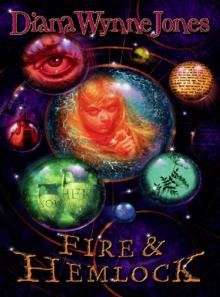 Fire and Hemlock
Fire and Hemlock Reflections: On the Magic of Writing
Reflections: On the Magic of Writing The Game
The Game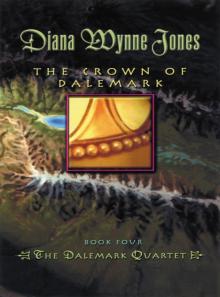 The Crown of Dalemark
The Crown of Dalemark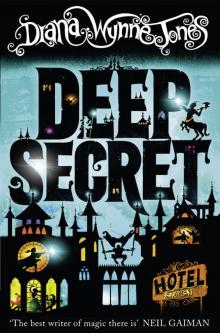 Deep Secret
Deep Secret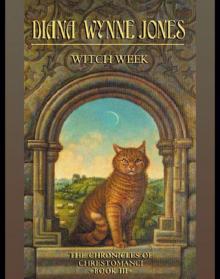 Witch Week
Witch Week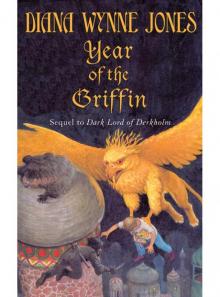 Year of the Griffin
Year of the Griffin Wild Robert
Wild Robert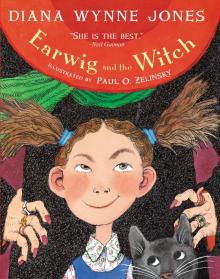 Earwig and the Witch
Earwig and the Witch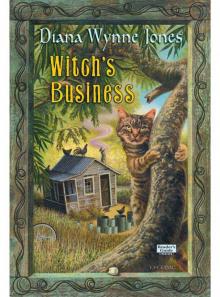 Witch's Business
Witch's Business Dogsbody
Dogsbody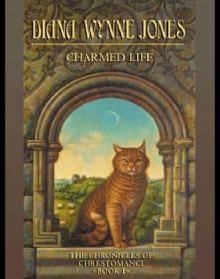 Caribbean Cruising
Caribbean Cruising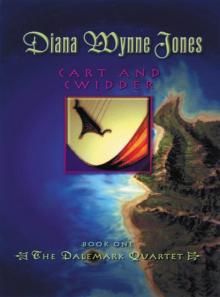 Cart and Cwidder
Cart and Cwidder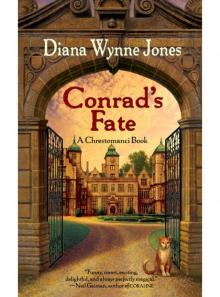 Conrad's Fate
Conrad's Fate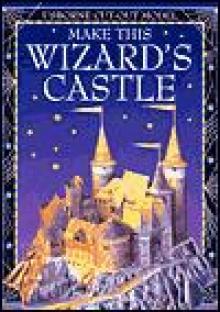 Howl's Moving Castle
Howl's Moving Castle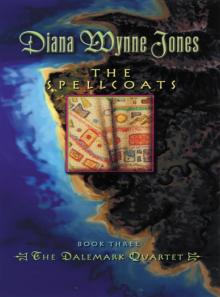 The Spellcoats
The Spellcoats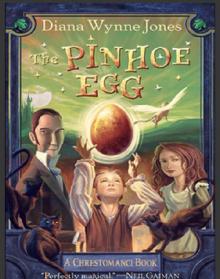 The Pinhoe Egg
The Pinhoe Egg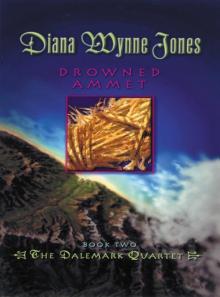 Drowned Ammet
Drowned Ammet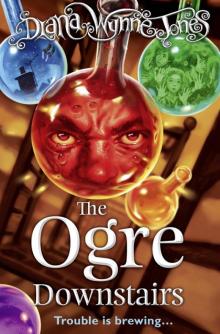 The Ogre Downstairs
The Ogre Downstairs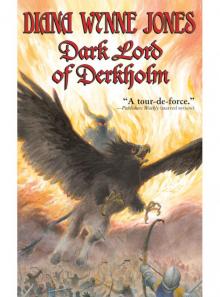 Dark Lord of Derkholm
Dark Lord of Derkholm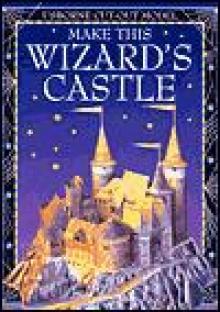 Castle in the Air
Castle in the Air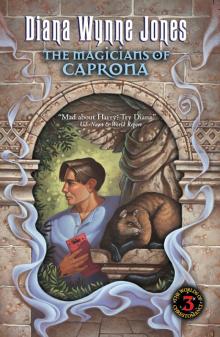 The Magicians of Caprona
The Magicians of Caprona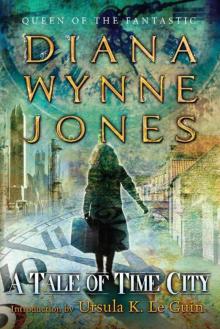 A Tale of Time City
A Tale of Time City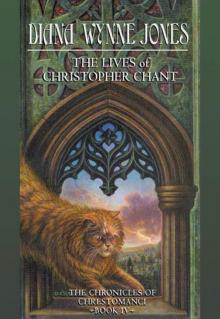 The Lives of Christopher Chant
The Lives of Christopher Chant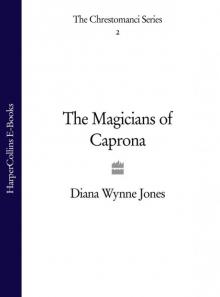 The Magicians of Caprona (UK)
The Magicians of Caprona (UK)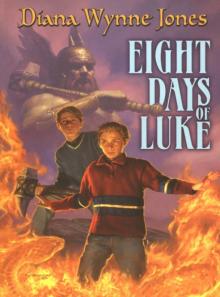 Eight Days of Luke
Eight Days of Luke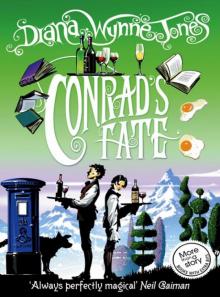 Conrad's Fate (UK)
Conrad's Fate (UK)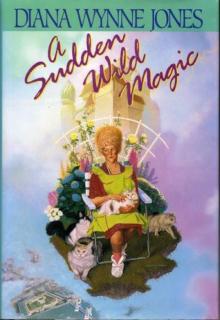 A Sudden Wild Magic
A Sudden Wild Magic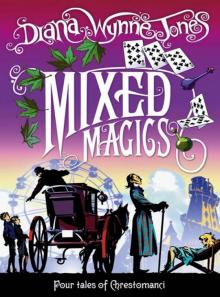 Mixed Magics (UK)
Mixed Magics (UK)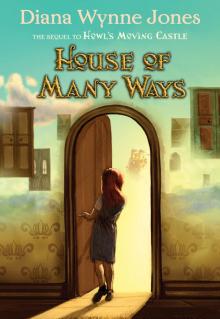 House of Many Ways
House of Many Ways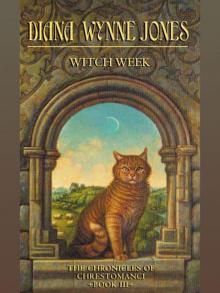 Witch Week (UK)
Witch Week (UK) The Homeward Bounders
The Homeward Bounders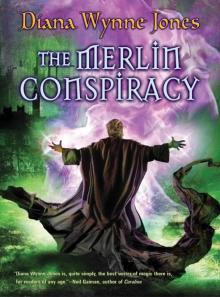 The Merlin Conspiracy
The Merlin Conspiracy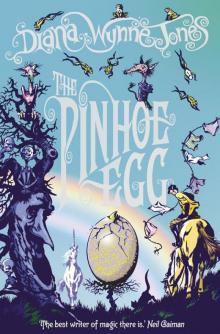 The Pinhoe Egg (UK)
The Pinhoe Egg (UK)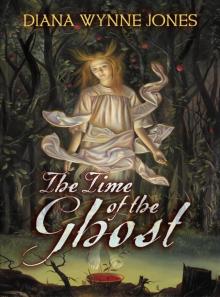 The Time of the Ghost
The Time of the Ghost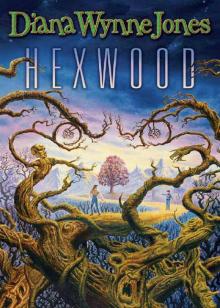 Hexwood
Hexwood Enchanted Glass
Enchanted Glass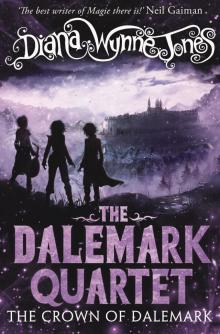 The Crown of Dalemark (UK)
The Crown of Dalemark (UK)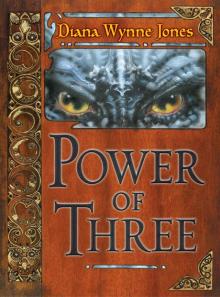 Power of Three
Power of Three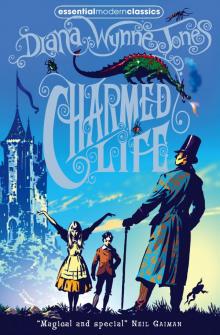 Charmed Life (UK)
Charmed Life (UK)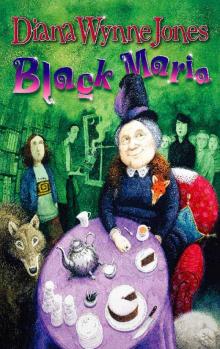 Black Maria
Black Maria The Islands of Chaldea
The Islands of Chaldea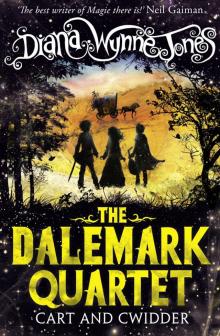 Cart and Cwidder (UK)
Cart and Cwidder (UK)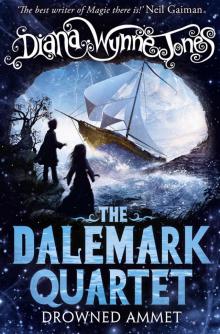 Drowned Ammet (UK)
Drowned Ammet (UK)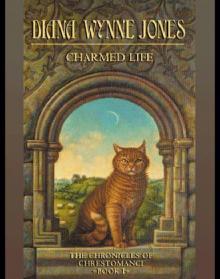 Charmed Life
Charmed Life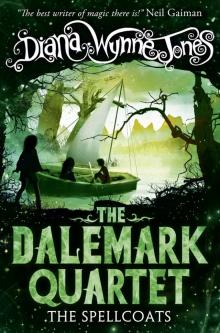 The Spellcoats (UK)
The Spellcoats (UK)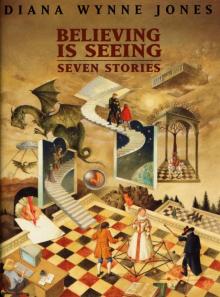 Believing Is Seeing
Believing Is Seeing Samantha's Diary
Samantha's Diary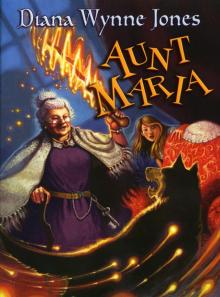 Aunt Maria
Aunt Maria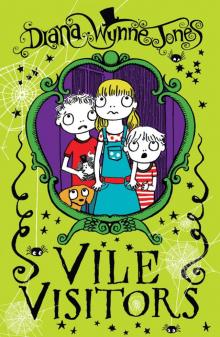 Vile Visitors
Vile Visitors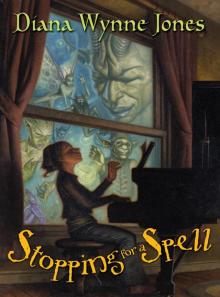 Stopping for a Spell
Stopping for a Spell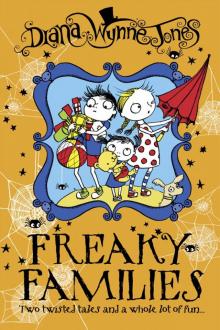 Freaky Families
Freaky Families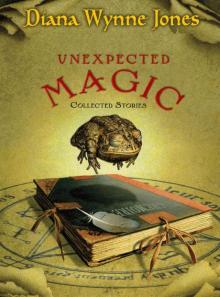 Unexpected Magic
Unexpected Magic Reflections
Reflections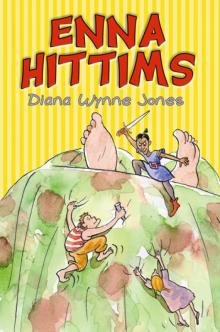 Enna Hittms
Enna Hittms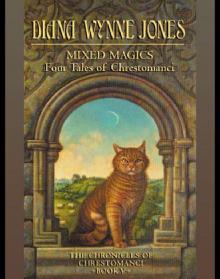 Mixed Magics: Four Tales of Chrestomanci
Mixed Magics: Four Tales of Chrestomanci